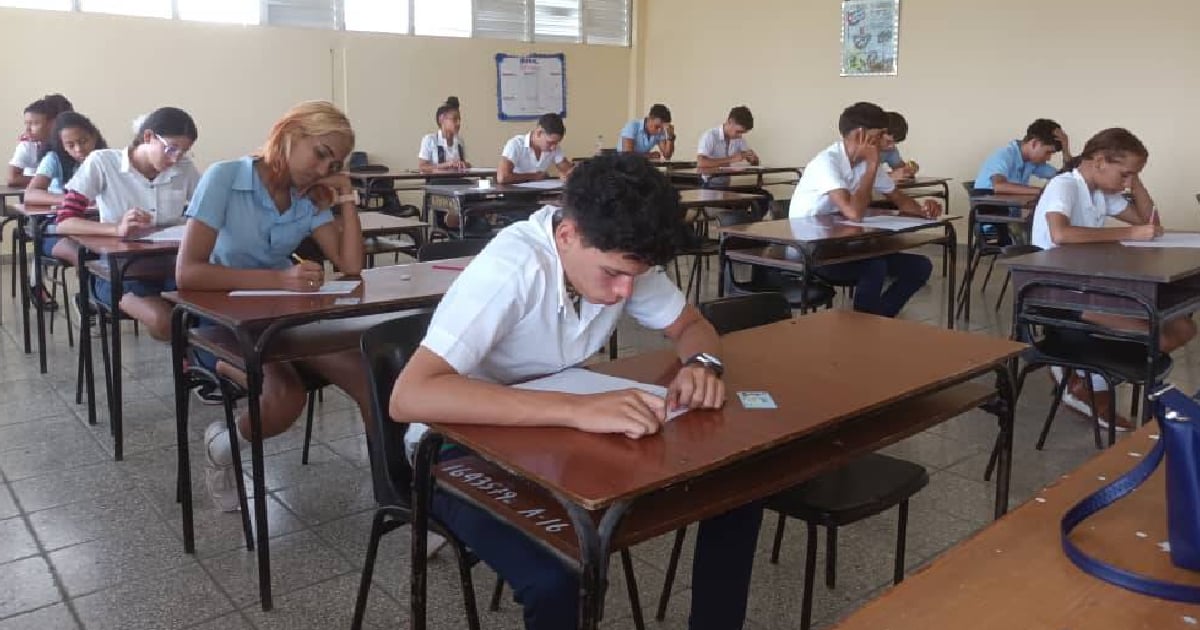The Ministry of Higher Education in Cuba will maintain its current schedule for university admissions, including students who have failed or did not take the entrance exams. This was announced by the ministry on its Facebook page, stating that "there are university and higher technical courses available for all young people wishing to enroll." They assured that "this process is automated and results will be published at each institution."
In a detailed breakdown of the admissions schedule, the University of Guantánamo revealed that the process consists of eight stages. The first stage is for those who took the entrance exams held last March. The second stage offers a reallocation for those who passed but are dissatisfied with their assigned course. The third stage welcomes applications from those who failed. In the fourth stage, these failed students can request any remaining available spots.
The subsequent stages follow a similar cycle but include those who did not take the exams and students from other educational levels besides pre-university. Last year, when this admissions method was introduced, the Cuban Minister of Higher Education, Walter Baluja García, told the official newspaper Granma that "we do not believe that this openness signifies a loss in the quality of graduates."
"Within the universities, our faculty assumes the responsibility of addressing any educational gaps that might exist in the students. Additionally, young people have the opportunity to switch between courses and specializations based on their performance," the minister added. Nonetheless, criticisms persist despite the regime's continued promotion of this flawed method.
"I've seen students fail in medical sciences; they should just eliminate the entrance exams," remarked one internet user. A female user who identified herself as a teacher and seemed to support this method suggested that "perhaps it could be improved by better aligning the application process, for example, mathematics is vital for engineering, biology for health sciences."
She added that she understands "the frustration over admitting failed students, but no one considers that our children, neighbors, and students are the result of a deficient educational system, and failing depends on many factors. We should think before marginalizing; I prefer failed students in university rather than prisoners in jails," she asserted.
Another user's critique went further, highlighting future issues. "Education holds less value every day. By filling vacant spots with these measures, incompetence in the workforce is rampant," he wrote.
Last year, nearly half of the students who took the university entrance exams failed. The Director of Admissions and Job Placement at the Ministry of Education of Cuba, René Sánchez Díaz, noted that out of 21,942 applicants, only 50.4% (11,063) passed all three exams, marking an 8.9 percentage point decrease compared to the previous year, according to Granma.
Sánchez Díaz attributed these results to the ongoing impact of the Covid-19 pandemic on students from ninth to twelfth grade, teacher workforce challenges in pre-university education, and limitations in student training and support. The Mathematics subject had a 52.7% pass rate, Spanish 92.1%, and History 76.4%.
Understanding Cuba's University Admissions Policy
Here are some frequently asked questions and answers to help clarify Cuba's current university admissions policy.
How does the automated admission process work in Cuba?
The automated admission process allocates university and higher technical courses based on various criteria, including exam results and available spots, and publishes the results at each institution.
What are the stages for university admissions in Cuba?
The process consists of eight stages, starting with applicants who took the entrance exams, followed by reallocations for those dissatisfied with their courses, and including applications from those who failed or did not take the exams.
What percentage of students passed the university entrance exams last year?
Last year, only 50.4% of the 21,942 applicants passed all three exams, showing an 8.9 percentage point decrease compared to the previous year.
What are the main reasons for the poor exam results?
The poor results are attributed to the ongoing impact of the Covid-19 pandemic, challenges in the teacher workforce, and limitations in student training and support.
